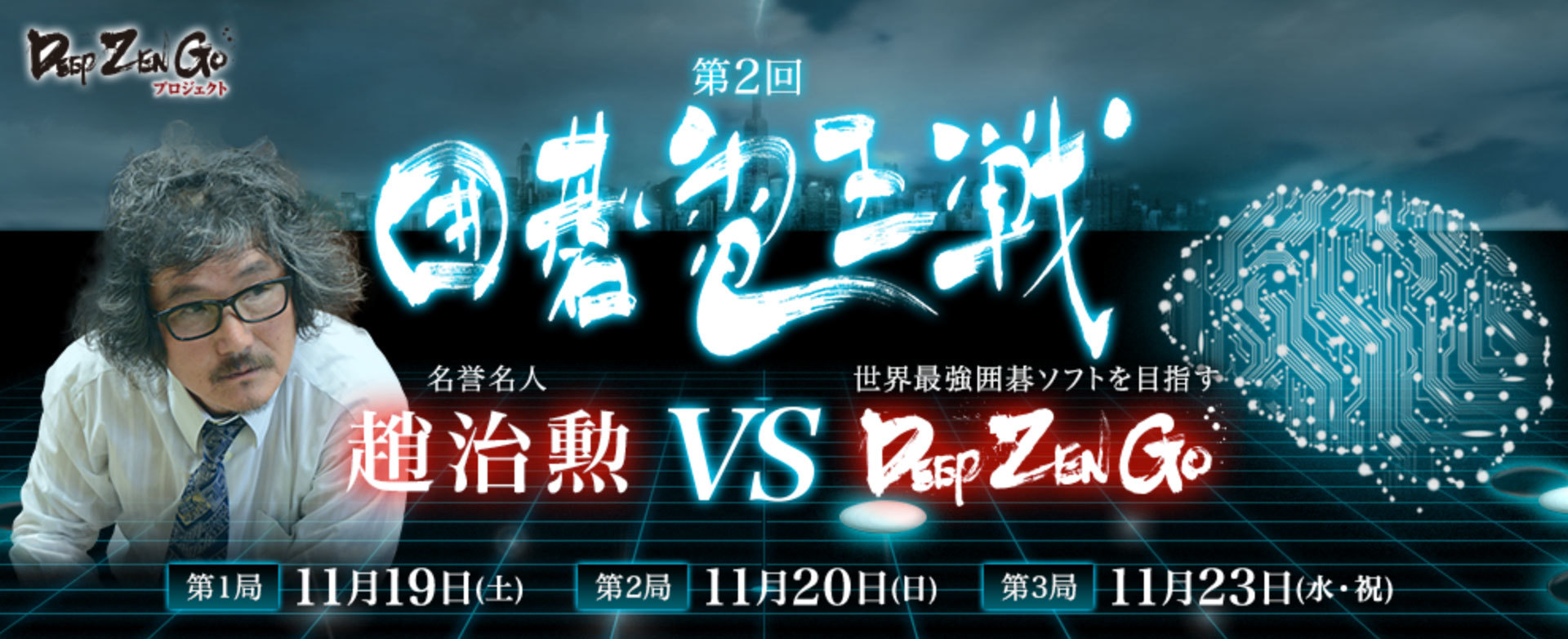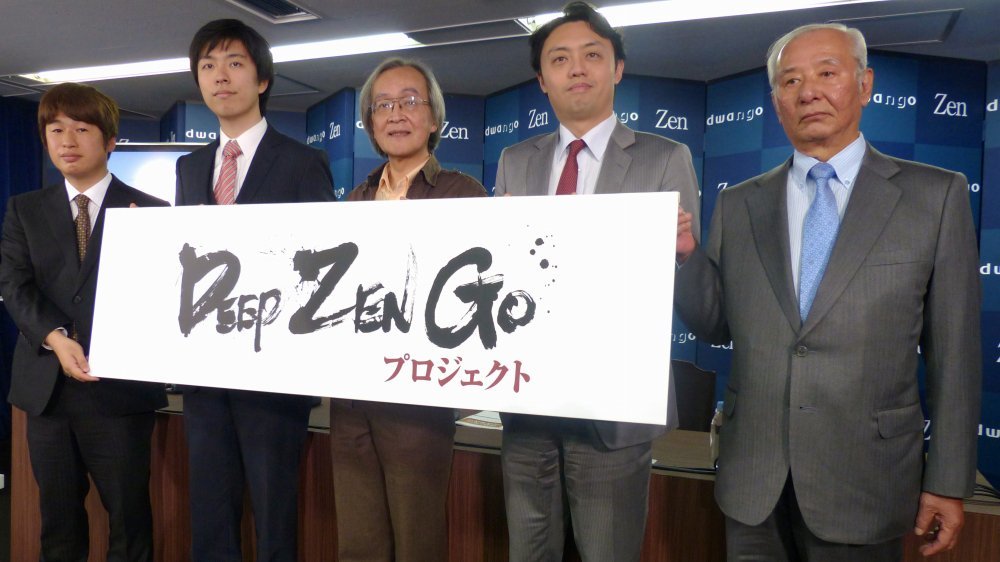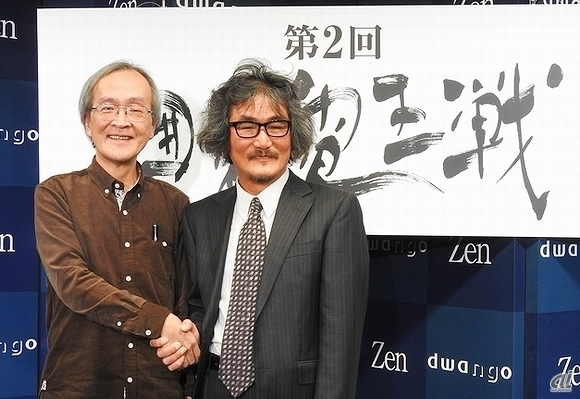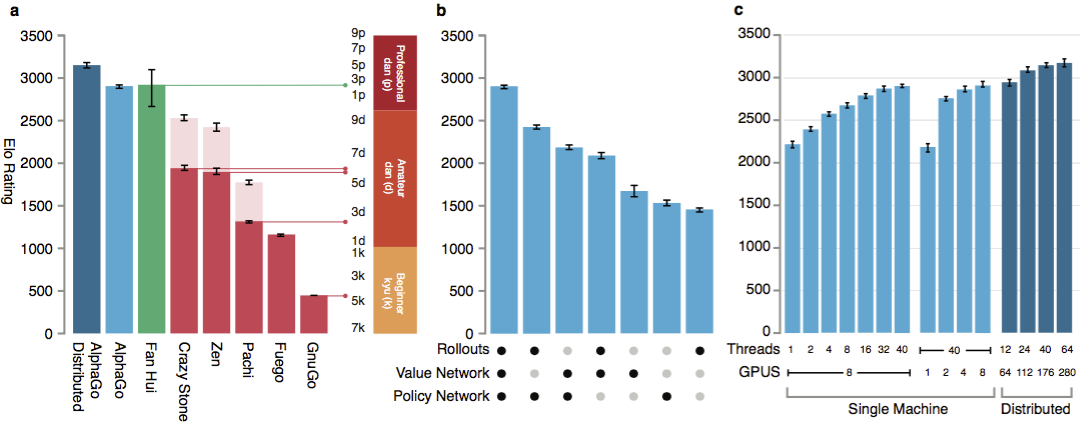Tyo Tikun and Deep Zen Go: another attempt to beat a man in th

On January 27, 2016, Google DeepMind for the first time publicly announced the success of its new development. The British artificial intelligence company, which Google bought in 2014, tried to conquer the ancient Asian game of go. At the beginning of this year, the status of go as a game that was beyond computer control was still unmoved. Computer go systems existed, but they were played at the amateur level. Professionals lost to them only with a significant handicap.
DeepMind built AlphaGo on a combination of the Monte Carlo method and artificial neural networks . After creating the system, adjusting its parameters and learning neural networks, it was tested against other programs of the computer and human champion. AlphaGo defeated the European champion of 2013, 2014 and 2015 Fan Hui.
')
In Europe, go skills are traditionally lower than in the game’s homeland in Asia. The validity of AlphaGo raised doubts . But Google immediately announced that the next AlphaGo match will be held with the owner of the 9th professional dan Lee Sedol, one of the best players in the last decade. In March, a series of five games took place ... and the man lost again with the score 4: 1 . The shock of the AI communities and go players was followed by complete silence about future matches. New matches against AlphaGo not planned .
An attempt to overcome AlphaGo will be carried out by the team of the Japanese project Deep Zen Go, which is still teaching its system to play against people. On November 19, 20 and 23, three games are planned against Cho Tikun, the 9th dan master from Japan. An interesting forecast is that of Aya Huan, an employee of DeepMind, who in March, as part of a historic match, sat opposite Lee Sedol and set stones on the board behind AlphaGo. Huan believes that the new version of Zen will win with a score of 3: 0 or 2: 1.
DeepMind solved a really difficult task. According to the rules of the game, two opponents place black and white stones on a board of a certain size (in professional games - 19 × 19). Stones can be captured, some actions are prohibited, there are a few more rules that vary depending on the game. But the goal is always the same: the one who separates the larger territory wins.
For a computer system, outwardly simple table fun is more complex: there are a hundred orders of magnitude more possible positions of stones on a 19 × 19 board than chess pieces on an 8 × 8 board. Stones do not decrease, they become larger - a base for the endings of the parties cannot be created. From the initial moves, you can quickly derive a new situation that cannot be foreseen. All this complicates the creation of powerful computer go systems.
The first programs playing go were created in the 70s. Since the beginning of the 80s the world championships among computer programs have been held. For a long time, cars lost to people with a handicap of 9 stones or more. Until the beginning of this year, the achievement was a victory on 4 odds stones.
The last technology squeak is a tree search or a Monte Carlo method, expert systems with a base of good moves. In DeepMind, neural network policies and values have been added to the Monte Carlo method. They were trained with the help of 160 thousand games from the server of KGS players from the sixth to the ninth dan. Then the system studied in batches against itself. The result is the defeat of the first European champion of the 2nd professional dan, then the defeat of the Korean champion of the 9th professional dan.
For Google, the meaning of development is not just a solution to a theoretical problem. This is a good reason to be proud. Matches attended by search engine co-founder Sergey Brin and other prominent employees. They all wanted to see the moment of the company's triumph.
Recently, artificial intelligence systems are gaining momentum on the same neural networks. Today, almost everyone in his pocket has an intelligent voice assistant who can answer questions in the human language: Siri, Google Assistant or Google Now, Cortana. Companies like to be reminded that this is only the tip of the iceberg of their AI achievements. For example, the victory of AlphaGo against the best of people Google executive director Sundar Pichai mentioned in his opening speech during the presentation of Google Pixel smartphones last month. A reminder about it was made somewhere between the new system of machine translation of directions English ← → Chinese and improved image and speech recognition algorithms.
The victory of Google "haunt" far. The match took place in the capital of South Korea and became the occasion to create a fund for a trillion won ($ 860 million) for the development of artificial intelligence systems. Developers of other computer go systems got acquainted with the reports of DeepMind and research on AlphaGo and improved their systems. Few people want to endure such a sharp newcomer on the well-established stage of go programs.
Deep zen go
On March 1, before the start of the match AlphaGo - Lee Sedol, the creator of the Zen program, Yoji Ojima and the Japanese company Dwango announced cooperation in creating a distributed version of Deep Zen Go. For Ojima, Zen was an amateur project that he could not seriously spend on. The company was ready to provide equipment and a specialist in machine learning. Also, the development team was supported by a team of in-depth training from the Tokyo University and the developer of the Ponanza program, the world's most successful computer shogi system, which beats professional people.

The ultimate goal - to win AlphaGo, the term of its achievement - from six months to a year. According to the authors of the program, AlphaGo has an advantage of 500 Elo rating points due to better pattern recognition. The creators of Zen decided that they could get 400 points by improving pattern recognition and 200 from other modifications. However, these estimates were given before the match with Li Sedol, only according to the games with Fan Hue.
Work has begun. The project is starting from March 1 of this year from the branch of the eleventh version of the program. In the twelfth version, the first machine learning developments appear. In version 12.2, the value network was built. In September, machine learning appears in version 12.4. According to the developers, their goal was not to make a copy of AlphaGo, but the developments from the Nature article were taken into account.
Real Zen performance is not just the reports of the development team. The system can be “felt” on the KGS server for online go games, where different versions of Zen have been playing blitz for 15 years per move for several years. Since March, there has been a gradual increase in the ranking of bots Zen. First among the top 100 appeared Zen19 , the next version of Zen19X was included in the top 50 players at the expense of its neural networks, Zen19A broke through the top twenty.
Zen19K and gets 8th dan on the KGS server - this version has a neural network of values. Physically, this player looks like a Kurisu server with two Intel Xeon E5-2623 v3 four-core processors and four Nvidia GTX Titan X (Maxwell) video accelerators. Already this version competes with professionals. For example, on August 30, Russian go-professional and multiple European champion Ilya Shikshin lost to bot, and 31 won .
The latest version of the Zen19K2 bot reached the 9th dan on the server for the first time and reached the first line of the rating. It is worth noting that this server is more popular in Europe and America, Asian professionals go to it very rarely.

The growth graph of the Zen19K2 bot ranking from September 8 to November 15, 2016.
Fight with a man
Zen shows progress in official matches against people. At the end of March 2016, Zen became the winner of the ninth cup of computer go , held by the Japanese University of electrical communications . This competition is considered the world championship among computer programs for the game of go. They played all the strongest programs, except AlphaGo - probably, Google considered that there was nothing to prove to them. As the winner of the tournament, the Zen program fought on 3 odds stones with the Japanese Kobayashi Koichi (9th professional dan) and won.
On July 27, in the framework of the European Go Championship , held this year in St. Petersburg, the Zen system with 2 odds won the game against Cho Heyang (9th professional dan), one of the strongest pro girls. Zen was again stronger. The program gradually reached the game on an equal footing with people.
To tell the world about AlphaGo, DeepMind held a match with the most experienced and award-winning professional man from those who were geographically accessible. Here comes a similar moment: according to the developers , the system has reached the level of the AlphaGo sample match with Fan Hue. A few days ago, we chose a new opponent for Deep Zen Go.

From left to right: one of the developers of Zen Kato Hideki and Cho Tikun.
Tyo Tikun is a 60-year-old master of the 9th professional dan from Japan, one of the strongest in the world of the 80s and 90s. During his career, he won more than a hundred major tournaments. Three games against him will be held on November 19, 20 and 23. These will be three games with Japanese 6.5 Komi points of compensation for playing white, with a standard for a large party with a duration of two hours and a beat 3 × 60 seconds.
A powerful horsepower server will come out against the man: two 22-core Intel Xeon E5-2699v4 , 4 Nvidia Titan X (this time the latest Pascal) processor , 128 GB of RAM, 128 GB solid-state drives (two-way) 480 GB.
Interestingly, Lee Sedol beat AlphaGo, which was launched in the Google Cloud Platform cloud on 1920 processor cores and 280 video accelerators. According to an article in Nature, the unallocated version loses distributed in 77% of cases. But if you believe the data of the DeepMind report, and the usual, unallocated version of AlphaGo is also not so weak. The graph on the right compares the performance of AlphaGo on a single machine and in a form distributed to a cluster of multiple servers.

Games will be broadcast on the web with comments in Japanese. It is unclear whether there will be official comments in English.
November 19, Saturday. The beginning of the broadcast: 06:30 Moscow time (12:30 in the time zone of Japan). Start of the game: 07:00 GMT (13:00 JST). The first game .
November 20, Sunday, time is the same. The second game .
November 23, Wednesday, time is the same. The third game .
As you can see, all three games take place on official weekends. November 23, in the rich on holidays, but poor in the holidays and time off of Japan - Thanksgiving Day of Labor .
A few days later, the outcome of the match with Chikun will be determined. The strength of a human player can be predicted and made a prediction. But little is known about AlphaGo: we have not seen a single public match since March. It is not known how much the development of DeepMind began to play during this time. Deep Zen Go continues to improve: developers hope that their program will soon reach AlphaGo level in March 2016.
For an all-encompassing technological giant, it is impermissible to surrender the laurels of an AI championship even in one symbolic direction. However, Google has more resources. But do not lose hope that the new Asian development will be able to beat AlphaGo in the official match if the parties appoint a duel. However, to start the program you need to learn how to win people.
The author is grateful for the help in compiling the article go_secrets group.
Source: https://habr.com/ru/post/399127/
All Articles